Natural Home Remedies for Pneumonia
By Dr Ashok Pal +2 more

Get,

to manage your symptom
Get your,


4 Cr+ families
benefitted

OTP sent to 9988776655



You’ve successfully subscribed to receive
doctor-approved tips on
Whatsapp

Get ready to feel your best.

Hi There,
Download the PharmEasy App now!!


Register to Avail the Offer
Send OTPBy continuing, you agree with our Privacy Policy and Terms and Conditions

Hi There,
Sign up on PharmEasy now!!
Trusted by 4 crore+ families

OTP sent to 9988776655



You have unlocked 25% off on medicines




Code: NU25

Comments


Leave your comment here
By Dr Ashok Pal +2 more
Table of Contents
Pneumonia is an infection of the lungs. It can occur in one or both of the lungs. It is a severe form of infection and can be caused by bacteria, viruses or fungi. In pneumonia, the lungs are filled with pus and fluid1. People of all age groups can contract pneumonia, but children aged four years and below, along with the elderly, are more prone to pneumonia2.
If you feel like you might have pneumonia, you should contact your healthcare provider immediately. A severe type of pneumonia may require hospitalisation. You will need diagnostic tests to confirm whether you have pneumonia3. Based on the diagnosis, your doctor will prescribe a treatment3. However, there are some remedies that you can follow to get relief from the symptoms of pneumonia, but these remedies should be used as supportive therapy and not as a stand-alone treatment.
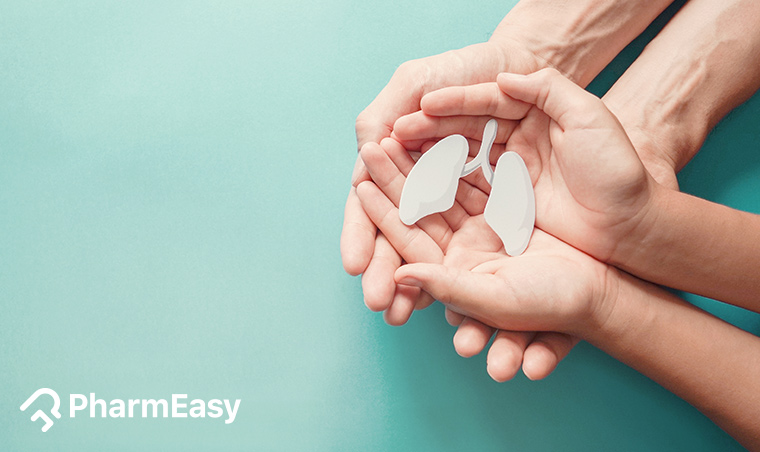
Pneumonia can be caused by bacterial, viral or fungal infections. Bacterial pneumonia is the most common type of pneumonia. You might develop bacterial pneumonia after you have contracted viral infections like flu or cold. Viral pneumonia is mostly mild and gets corrected on its own after a few weeks. But sometimes, it can be serious enough to require hospitalization. Fungal pneumonia is often seen in people with a weakened immune system or people with long-term medical conditions3.
If you are pregnant and develop pneumonia, consulting a physician is very critical as it may harm the fetus and the mother as it reduces the flow of oxygen and may be a cause of premature birth.
Dr. Ashish Bajaj, M.B.B.S., M.D. in Clinical Pharmacology and Toxicology
Symptoms of pneumonia include:
The symptoms of pneumonia may vary from mild to severe in different age groups. Some infants and newborns may not show any signs of infection. While some might show signs of vomiting along with cough and fever. Older people may show milder symptoms along with fever3.
Most people affected by pneumonia will be able to stay at home and undergo treatment. The home remedies mentioned below might help you with the symptoms of pneumonia.

Getting rest is very important in pneumonia. Taking plenty of rest will help you to recover from pneumonia. Also, as you are taking a rest, you should try to sit up more than lying down. Sitting up will help you to feel better2.

You can try increasing your fluid intake to help you recover from pneumonia. Drinking plenty of fluids is very important for pneumonia2. It will help to prevent dehydration and also help to aid in your recovery. Water plays a huge role in our health.
You can use the herbs mentioned below to get relief from the symptoms of pneumonia. These herbs will help you to get rid of the cough and help you breathe easy.
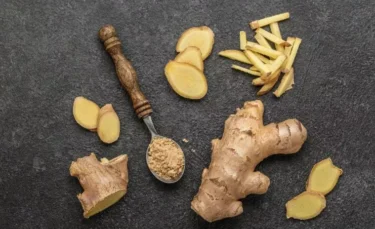
Ginger is beneficial in many respiratory problems, including cough. Ginger is a widely used natural remedy for cough. There are several ways to use ginger.
You can crush some fresh ginger, add it to water and bring the water to a boil. This ginger water can be taken several times a day to relieve coughing and chest congestion. Ginger can also be taken in combination with Tulsi leaves. Take crushed leaves of Tulsi, mix them in ginger juice and add honey for the taste. You can swallow this mixture to relieve the cough4.
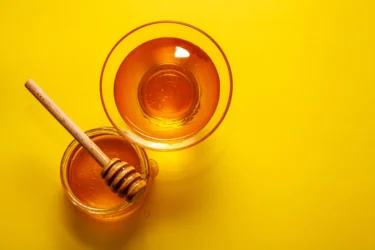
Honey is an effective cough remedy. Drinking hot milk with honey can help to get rid of dry cough and relieve chest pain that might arise due to constant coughing. Honey is easily accessible, which makes it a viable option4.
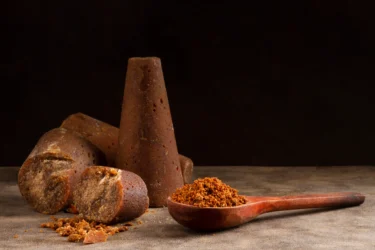
Jaggery is an effective remedy to relieve cough as well as chest congestion. It can help in expelling the sputum built up in the lungs and providing relief from the feeling of congestion in the entire respiratory tract. To use jaggery, you can boil some jaggery with pepper and add some cumin seeds. Drink this mixture to get relief from symptoms like chest congestion4.
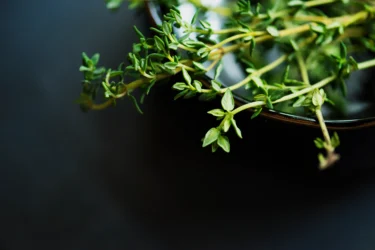
Thyme leaves are good for respiratory problems. The essence extracted from the leaves helps to manage cough and bronchitis (inflammation of the lining of the bronchial tube, which carries air to and from the lungs). Thyme leaves also contain flavonoids that have many health benefits. They relax throat muscles and reduce swelling. You can easily prepare thyme tea at home. Thyme tea is prepared by taking crushed leaves and boiling them with water. Let it rest for some time to steep all the essence. Drinking this tea helps to relax the lung muscles and open the airways4.
Breathing excercise like pranayama is important in recovery phase to improve injured lung capacity.
Dr. M.G. Kartheeka, MBBS, MD(Pediatrics)

Grapes can help in releasing the mucus from the affected parts of the respiratory tract. You can eat grapes to get their benefits. Another way of using grapes is making some fresh grape juice. You can drink this grape juice to help clear out the mucus. You can also take this grape juice with honey to enhance its effectiveness4.
Also Read: Is Pneumonia Contagious? Causes, Transmission, Symptoms & Treatment

Cayenne pepper or red pepper is an effective remedy for cough. It also reduces the chest pain associated with continuous coughing. Cayenne pepper can be used along with ginger, honey, apple cider vinegar and water4.
Also Read: Home Remedies For Viral Fever
Pneumonia is a respiratory infection that can become severe and in some cases, it can also become fatal5. If you notice any symptoms of pneumonia, contact your healthcare provider immediately.
Also Read: Home Remedies For Mosquito Bite By Dr. Siddharth Gupta
Pneumonia is a lung disease that can be caused by bacteria, fungi and viruses. Pneumonia can be mild or serious, depending on the cause. In pneumonia, one or both of the lungs get filled with mucus and fluids, which cause symptoms like breathlessness and chest pain. Most cases of pneumonia might require people to stay at home. You can use home remedies like ginger, jaggery, honey and thyme to get relief from the symptoms. Drinking plenty of fluids and taking rest can help you to speed up your recovery. If you notice any symptoms of pneumonia, seek medical help immediately. First, it is important to get the necessary diagnosis. Your doctor will prescribe a treatment based on your diagnosis.
Also Read: Simple Home Remedies for Sneezing
Some remedies can be used to ease the symptoms of pneumonia. Ginger, thyme, cayenne and honey can be used to relieve cough and congestion. You can also use jaggery to help with the cough4. You also need to take plenty of fluids to aid in your recovery2. It is advised to follow up with the doctor for treatment of pneumonia.
While viral pneumonia may improve on its own with time, bacterial and fungal pneumonia require timely medical attention. Also, you need a proper diagnosis to confirm pneumonia3. Pneumonia is a lung infection that can become severe, if not treated timely5. Therefore, it is important to consult with your doctor and get the necessary diagnosis and treatment.
Yes, pneumonia is a severe lung infection that requires timely medical intervention. Pneumonia, if not treated in time, can become fatal5. If you notice any signs or symptoms of pneumonia, contact your doctor or healthcare provider immediately.
Pneumonia is a lung disease that is caused by bacteria, viruses or certain fungi. Bacterial pneumonia is the most predominant form of pneumonia3.
Viral pneumonia can get better with time on its own3. But, you should consult with your doctor to get a proper diagnosis based on your symptoms. If you notice any symptoms of pneumonia, contact your doctor immediately.
Most cases of pneumonia respond well to the treatment. But pneumonia can have severe and even deadly complications. The risk of developing such complications is high in the elderly, young children, people with a weak immune system and people who have cirrhosis or diabetes. The complications involve respiratory failure, lung abscesses (swollen areas containing pus) that might require surgery and sepsis (infection reaches the blood)1.
1. Johns Hopkins Medicine [Internet]. Pneumonia; [cited 2022 May 17]. Available from: https://www.hopkinsmedicine.org/health/conditions-and-diseases/pneumonia
2. Better Health Channel [Internet]. Pneumonia; [cited 2022 May 17]. Available from: https://www.betterhealth.vic.gov.au/health/conditionsandtreatments/pneumonia
3. MedlinePlus [Internet]. Pneumonia; 2021 Jun 20; [cited 2022 May 17]. Available from: https://medlineplus.gov/pneumonia.html
4. Sultana S, Khan A, Safhi MM, Alhazmi HA. Cough Suppressant Herbal Drugs: A Review. Int J Pharm Sci Invent [Internet]. 2016 Aug [cited 2022 May 17];5(5):15-28. Available from: https://www.researchgate.net/publication/308369657_Cough_Suppressant_Herbal_Drugs_A_Review
5. American Lung Association [Internet]. Five Facts You Should Know About Pneumonia; 2020 Oct 23 [cited 2022 May 17]. Available from: https://www.lung.org/lung-health-diseases/lung-disease-lookup/pneumonia/five-facts-you-should-know
Disclaimer: The information provided here is for educational/awareness purposes only and is not intended to be a substitute for medical treatment by a healthcare professional and should not be relied upon to diagnose or treat any medical condition. The reader should consult a registered medical practitioner to determine the appropriateness of the information and before consuming any medication. PharmEasy does not provide any guarantee or warranty (express or implied) regarding the accuracy, adequacy, completeness, legality, reliability or usefulness of the information; and disclaims any liability arising thereof.
Links and product recommendations in the information provided here are advertisements of third-party products available on the website. PharmEasy does not make any representation on the accuracy or suitability of such products/services. Advertisements do not influence the editorial decisions or content. The information in this blog is subject to change without notice. The authors and administrators reserve the right to modify, add, or remove content without notification. It is your responsibility to review this disclaimer regularly for any changes.
Comments

Leave your comment...

View all comments(2)
You may also like
Thanks and stay blessed
Are there any great tasting recipes with these super foods for easing the symptoms of pneumonia that you might be able to suggest? My husband and I have very recently been diagnosed with bronchopneumonia and are not will or well enough to go out to spread the illness (nor would we want to) or feel worse then what we already do. Any advice or suggestions would be greatly appreciated. Thank you and god bless. Stay clean and safe and don’t get sick 🙁 it sucks.
Thanks,